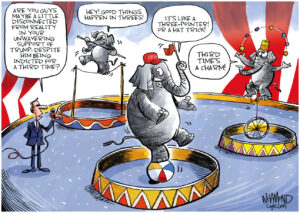WSJ Attacks Lina Khan Every 11 Days Since FTC Appointment
Corporate America is increasingly worried that the anti-trust champion will hold them to account. Lina Khan. Photo: Graeme Jennings / AP.
Lina Khan. Photo: Graeme Jennings / AP.
One important way to get a finger on the pulse of the US power elite is to pay attention to the business press. The Wall Street Journal, the US’s top-circulation newspaper, is well-known as the voice of the financial establishment. In the Biden years, one of its ongoing obsessions is publishing screeds against Lina Khan, chair of the president’s Federal Trade Commission (FTC).
The American Economic Liberties Project is currently tracking Journal articles that mention the FTC chair with a new tool called the “Wall Street Grumble.” These range from full-length attacks on Khan to sentence-long side-swipes. By AELP’s count, the Journal has published an attack on Lina Khan once every 11 days. As AELP notes:
The Journal also regularly publishes pieces that insert Chair Khan into seemingly unrelated or tangential issues, including blaming her for last year’s baby formula crisis, urging the Congressional China Select Committee to investigate her efforts to hold Big Tech monopolies accountable, and suggesting that she supports the World Economic Forum’s “No Grow” proponents.
For example, after the FTC decided to block the merger between medical distributor company Illumina and medical testing company Grail, a Journal op-ed declared (4/27/23): “Lina Khan Blocks Cancer Cures.” Grail does not in fact cure cancer, nor would blocking the merger bar its technology from the market. The FTC challenged it on the grounds that since Grail’s technology requires Illumina’s systems to function, the merger could prevent similar technologies under development from competing.
Here is a small sample of other sensational headlines from the Journal:
- “The FTC’s Antitrust Collusion” (2/23/23)
- “Lina Khan’s Non-Compete Favor to Big Labor” (1/8/23
- “The Many Abuses of Lina Khan’s FTC” (2/14/23)
- “Lina Kahn Is Icarus at the FTC” (7/13/21)
- “Lina Khan’s Power Grab at the FTC” (7/5/21)
- “‘Hipster’ Antitrust Goes Beltway at the FTC” (1/17/23)
David Dayen is the editor of the American Prospect, one of the few DC-focused magazines that regularly covers the obscure regulatory fights that shape corporate America. He told FAIR that he hasn’t seen a regulatory official endure this level of right-wing backlash in 50 years. The last time, he said, the target was Michael Pertschuk, the FTC chair under Jimmy Carter. As with Khan, Pertschuk effectively wielded the tools of government against corporate power. Dayen says the coincidence “says something about how the business community fears a muscular presence at that agency.”
Khan provoked discussion as a law student with her famous law review note, “The Amazon Antitrust Paradox” (Yale Law Journal, 1/17), which outlined how lax enforcement of antitrust laws allowed behemoths like Amazon to dominate the economy and stifle competition. While size and market power were the original markers of a monopoly, Khan argued, since the 1980s, the standard for anti-competitive behavior has focused on “consumer welfare.” This has been narrowly interpreted to mean lower prices for consumers, while the competitiveness of the market, quality of products, effects on choice and other important impacts on the consumer experience are omitted from analysis.
As with Khan, Pertschuk effectively wielded the tools of government against corporate power.
Limited antitrust enforcement often fails on these narrower grounds as well (firms without a competitor usually increase prices over the long term—as, indeed, Amazon has, as it’s consolidated market share). But this reinterpretation of antitrust as being just about consumer prices has allowed courts to ignore obvious anti-competitive mergers, and has allowed our economy to consolidate into a few big players.
Khan’s return to tradition marked a paradigm shift in antitrust discourse. She continued to make waves when Biden appointed her to chair the Federal Trade Commission, one of the most important bodies for antitrust enforcement. Kahn’s more aggressive stance against big business has elicited retaliation, in the form of a public campaign against her in the biggest US paper. “I think the crusade indicates that Lina Khan is effective, and corporate America doesn’t want that effectiveness to spread,” said Dayen.
While it doesn’t often grab headlines, corporate consolidation looms large over many problems facing Americans today. As Dayen wrote in his 2020 book Monopolized: Life in the Age of Corporate Power:
There are four major airlines, four major commercial banks, four major companies that deliver phone, wireless, cable and internet services. One company controls most web search; one company controls most social media; one company controls about half of all e-commerce. Handfuls of firms dominate virtually every aspect of food and agricultural production, media, military equipment, medical supply and regional hospital management.
When enormous chunks of every industry are controlled by a small number of firms who increasingly dominate the government and its policy, these companies and their shareholders are effectively an unaccountable oligarchy.
While the Biden era is full of gloomy headlines about the state of the country, the world of antitrust is one of the few areas of the government where serious positive developments are being reported. After lobbying from progressive groups, the administration began making appointments that signaled a serious intention to revive the government’s antitrust activity. His first summer in office, Biden signed a sweeping executive order designed by anti-monopoly professor Tim Wu. The order outlined 72 different actions that would reorient stagnant regulatory bodies to promote competition.
The attacks from the business press demonstrate that corporate America is used to having a government that refuses to govern.
In addition to Khan and Wu (who has since left government), Biden hired antitrust lawyers like Jonathan Kanter who are considered part of the “New Brandeisian” movement—named for Progressive Era anti-monopoly Supreme Court Justice Louis Brandeis.
Khan’s FTC is taking on major issues like anti-worker noncompete agreements, personal data collection and commercial surveillance. With Kanter at the DoJ, the government has successfully blocked the merger between publishing giants Penguin Random House and Simon & Schuster. In the background, lawsuits against Big Tech companies are making their way through state and federal courts across the country, some aimed at reversing some of the enormous number of Silicon Valley mergers and breaking up monopolistic online platforms.
Dayen suggests that effects of the New Brandeisians may be rubbing off on other departments, citing the recent hiring of Jen Howard at the Department of Transportation. Even a modest increase of antitrust activity causes massive ripples through corporate America, as the threat of enforcement deters anti-competitive activity.
The attacks from the business press demonstrate that corporate America is used to having a government that refuses to govern. As Dayen says, the shift “scares the living daylights out of the interests represented at the Wall Street Journal editorial page. The fear is palpable with each hastily written op-ed.”
Your support matters…Independent journalism is under threat and overshadowed by heavily funded mainstream media.
You can help level the playing field. Become a member.
Your tax-deductible contribution keeps us digging beneath the headlines to give you thought-provoking, investigative reporting and analysis that unearths what's really happening- without compromise.
Give today to support our courageous, independent journalists.






Market monopolization and Wealth Concentration go hand in hand and lead to economic stagnation as more and more money is concentrated into the hands of ever fewer people. Antitrust, and increased tax rates for the Wealthy, are the historical tools that have been used to address these issues. And these tools are still at hand if the government decides to use them.